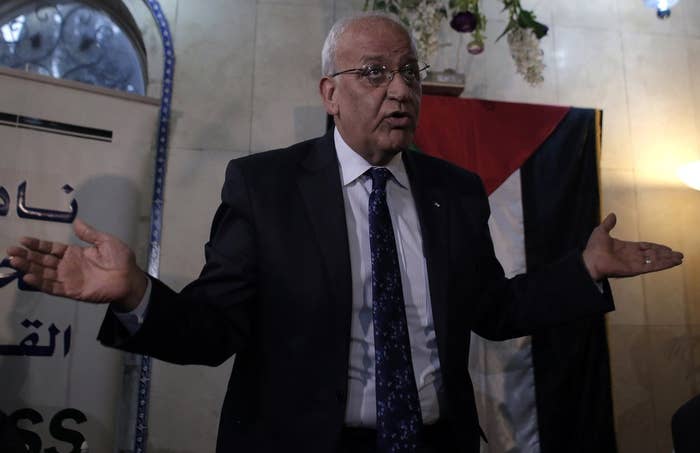
JERUSALEM — Chief Palestinian negotiator Saeb Erekat on Thursday said that Israeli Prime Minister Benjamin Netanyahu is not a partner for peace, and his re-election is "dangerous" for those who still want to see a two state solution.
Erekat told reporters in Jerusalem on Thursday that the Palestinian Authority was moving forward on threats to cease all security cooperation with Israel and had formed a committee that would draft a series of mechanisms to end those ties. Within two weeks, he said, those mechanisms would begin to be implemented.
"I can assure you that something will happen," said Erekat, in response to questions by several reporters who pointed out that the Palestinians have been threatening to end security cooperation for over a decade but have never acted on it.
Security is one of the final areas of cooperation between Israelis and Palestinians following years of failed peace talks. The Palestinian security forces, which are financed by the U.S. and receive much of their training from U.S. forces, is responsible for security in Palestinian-controlled areas, though Israel's army regularly enters those areas.
A PA official who later spoke to BuzzFeed News on condition of anonymity said the PA was looking at initial steps it could take, including not coordinating with the Israeli army when they wanted to enter Palestinian territories. Another step, he said, would include no longer arresting wanted Palestinian militants on behalf of the IDF and handing them over.
"On the prisoners, definitely that is something we would stop coordination on," said the official. "On other issues it would be more difficult, such as intelligence sharing. That, honestly, would be difficult to stop."
Erekat said that security cooperation between the Palestinian Authority and Israel was a "complicated and involved" affair, and that it could take a long time to disentangle. He insisted, however, that the Palestinians saw Netanyahu's comments disavowing a Palestinian state and promises to expand settlements as a direct violation of the agreements behind the peace talks. As such, Erekat said, the Palestinians felt justified in moving forward with their own actions.
"We aren't going to continue the status quo anymore. Our mission, our contracts, our signed agreements, specified very much what this peace process is about. It's about a two-state solution. And if the prime minister of Israel is saying that he will not allow the creation of a Palestinian state… What does he want me to negotiate with him about?" asked Erekat, who has been involved in peace negotiations for over two decades.
When asked whether he thought Netanyahu would walk back some of his comments now that he has been re-elected and is in the process of forming a new government, Erekat appeared incredulous.
"Can you imagine Netanyahu standing up and saying, 'I'm sorry, I didn't mean it, but I believe in a two-state solution, I recognize the state of Palestine, I will carry my obligations, I will stop settlement activities — people will laugh," Erekat said.
However, just hours before Erekat spoke, Netanyahu gave an interview to NBC News in which he appeared to moderate some of his earlier comments, saying they were an attempt to drum up support at the ballot box and "counter a foreign-funded effort to get votes that are intended to topple my party."
Netanyahu suggested that he remained open to the possibility of new peace talks, by saying that Israel would "need the recognition of a Jewish state and real security in order to have a realistic two-state solution."
"I was talking about what is achievable and what is not achievable," Netanyahu said. "To make it achievable, then you have to have real negotiations with people committed to peace ... it's time we saw the pressure on the Palestinians to show that they are committed too."
Netanyahu also said that in order to achieve peace, the Palestinians would need to abandon their "pact with Hamas."
White House Press Secretary Josh Earnest told reporters during his daily briefing on Thursday that the U.S. review of its policy towards resolving the Israeli-Palestinian conflict would continue despite Netanyahu's walkback. "Words matter and that is certainly true in this instance," Earnest said, adding that "the president takes [Netanyahu] at his word."
Later Thursday, the White House released a readout of a phone call between Obama and Netanyahu, the first after the election, in which the president congratulated the prime minister on his party's success. Obama "reaffirmed the United States' long-standing commitment to a two-state solution that results in a secure Israel alongside a sovereign and viable Palestine," it read.
Not in the readout, however, is that the two leaders "also discussed Prime Minister Netanyahu's comments about Israeli Arabs." Earnest on Wednesday said Netanyahu's comments "[undermine] the values and democratic ideals that have been important to our democracy and an important part of what binds the United States and Israel together."
